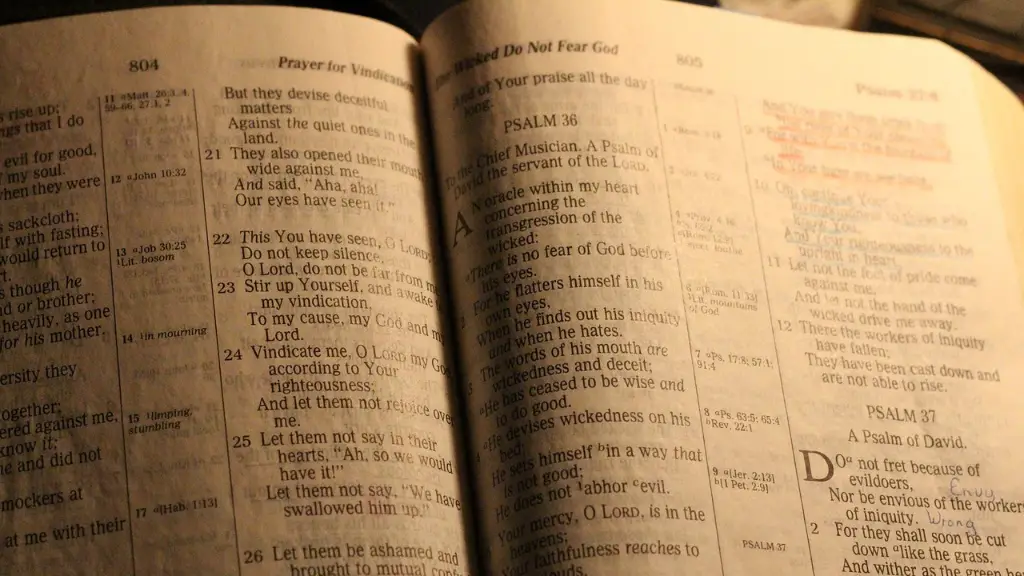The Bible is the most widely read book in history; billions of copies have sold over the years, and yet its presence is in some way restricted in certain countries around the world. We often hear about bans on books or other forms of media, so why are some countries banning the Bible too? In order to answer that question, let’s take a look at the history of how the Bible has come to be banned in some countries around the world.
The Bible has faced numerous bans since the introduction of book printing, beginning with Emperor Leo III in 726AD. Through the centuries, many other political leaders, such as Stalin and Mao, had similar policies with the Bible being banned due to its religious content. Many countries today also still keep their restrictions in place, with some being more lenient while others take a more restrictive approach. While each country is different, some general trends can be identified in the types of countries that ban the Bible.
First, it is important to note that many of the countries that ban the Bible are countries that do not have freedom of religion. These countries include some Muslim-majority countries, such as Saudi Arabia and Pakistan, that impose strict laws about what books and media can be read, including the Bible. Similarly, some communist countries such as North Korea and China have strict control over religious material, and thus banning the Bible. Additionally, other countries such as Burma and Laos, while not explicitly banning the Bible, have laws that restrict religious material and activities, meaning the Bible is not widely available.
Secondly, countries that ban the Bible don’t just restrict access to the Bible itself, but also to any book or material related to it. This means that even if a Christian missionary is allowed to enter a country, they cannot bring a Bible to distribute or preach with. Furthermore, it is important to note that in some countries, even owning a Bible is a criminal offense, with a potential punishment ranging from a fine to jail time. This is the case in countries such as Saudi Arabia, which has an official policy of not allowing citizens to possess the Bible.
Thirdly, although the Bible is banned in many countries, this does not mean that its influence stops there. In some cases, Christians in banned countries have found ways to continue to spread the word of the Bible, even in hostile environments. For example, in North Korea, reports have emerged of missionaries, who can go into the country as tourists, spreading the word of God, although in a much less public way than in most other countries. Similarly, in other countries such as China, there have been reports of secret churches emerging and using creative methods to spread the message of the Bible, such as using text messages.
As we can see, while some countries explicitly ban the Bible, in many others there are more subtle restrictions in place that make it difficult to access the religious material. While it is important to be aware of these restrictions, it is also important to remember that many Christians still believe and practice in these countries, even under the most difficult of circumstances.
Creative Ways of Circumventing the Ban
In spite of the bans on the Bible in some countries, there are ways and means to get around them. Some organisations, for instance, have resorted to the use of technology in order to smuggle Bibles into those countries and ensure that they are distributed to those who need them. For example, there is a project called “Operation Undercover” which makes use of an app that allows people to download a digital copy of the Bible and save it onto their phones. This way, Christians are able to access the Bible without risking jail time or being caught with a physical copy.
Furthermore, religious organisations have also resorted to using other creative methods in order to get around the bans. For instance, in North Korea, some churches have resorted to using cultural events as a way of getting Unsanctioned Bible readings out to the public. This is done by using traditional Korean folk songs, which are designed to contain Biblical passages as well as other religious messages. By using these folk songs, religious leaders have been able to sneak Biblical teachings into North Korea without running the risk of being caught.
Finally, there are also organisations that are actively seeking to challenge the bans on the Bible in certain countries. There are human rights activists and organisations such as Samaritan’s Purse and Open Doors that are actively working to draw attention to the issues caused by the bans and advocate for their removal. These organisations are actively seeking to make sure that all citizens, regardless of their faith, are able to access the Bible and practice their beliefs freely.
Alternatives to the Bible
In some countries where the Bible is banned, alternative religious material has started to emerge in order to satisfy the needs of religious believers. For example, in many Islamic countries, the Quran is not banned and thus is often used as a way of providing spiritual nourishment to those who do not have access to the Bible. Similarly, in other religious contexts, there have been efforts to provide alternative material to the Bible. For example, in some countries, Buddhist and Confucian texts are often used as a religious substitute to the Bible, while in other countries, more contemporary material such as religious bestsellers are also being used as a replacement.
Furthermore, some churches have also sought to provide alternative material in order to fill the gap left by the lack of the Bible. For example, some churches have started to use specially commissioned excerpts from the Bible in order to provide religious teaching to their congregations. Additionally, some churches have started to produce special religious recordings, such as sermons, which can be downloaded and listened to in places where the Bible is banned.
Finally, there is also a growing online presence of alternative religious material in places where the Bible is banned. For example, many churches have created online presence on the Internet, through websites, blogs, and other social media. These churches often provide religious material in digital format, which can then be accessed and consumed by believers, even if the physical Bible is not present.
The Impact of the Ban on Society
The impact of the bans on the Bible in certain countries is a complex one. On the one hand, the bans do ensure that the state has more control over religious thought and behaviour. On the other hand, it prevents religions from playing an important role in the country’s public life and prevents individuals from engaging in meaningful religious practice. In addition, it may also be argued that the bans interfere with the individual’s right to access material which is of enormous spiritual and educational value.
Furthermore, it can also be argued that the bans have a negative impact on the ability of believers to evangelise and spread religious teachings. This is due to the fact that access to the Bible is restricted, and thus it is not possible to use it to spread religious beliefs. Additionally, the bans may have the effect of preventing new believers from converting to Christianity, as they will not have access to material which explains the doctrines and beliefs of the religion.
Finally, it is also worth noting that the bans on the Bible have also been a source of frustration for many individuals within these countries. This is due to the fact that, with access to the Bible being restricted, many people have felt that their rights to freely practice their religion have been undermined or denied. As a result, many believers have had to resort to other forms of worship, or even clandestine practices, in order to fulfil their spiritual needs.
The Outlook for Bible Bans
Looking to the future, it is likely that the bans on the Bible in some countries will remain in place for some time, however it is also likely that some changes may be seen in the coming years. The most likely change is that some countries may start to loosen their restrictions, allowing more access to the Bible, or at least digital copies of it. This may be seen in some Muslim countries, where access to religious literature is slowly becoming more common.
Another possibility is that some countries may begin to relax the restrictions on churches and other religious organisations. This could allow more open preaching, a greater presence of religious organisations in the public sphere, and more access to religious material such as the Bible. This could lead to an increase in religious freedoms, and potentially even the legalisation of the Bible in some countries.
Finally, it is also possible that some countries may see an increase in underground religious activity. This is due to the fact that, in countries where the Bible is banned, many believers may turn to clandestine methods in order to express their faith or access religious material. This could mean that there may be an increase in the underground church movement, or other forms of secret religious practices which are not sanctioned by the state.
The Global Perspective on Bible Bans
From a global perspective, it is clear that the issue of Bible bans is a complex one, with different countries taking different stances on the issue. While many countries have explicit bans on the Bible, others may have more subtle restrictions in place. It is also clear that some countries have more restrictions than others, with some going as far as to criminalise owning a Bible.
However, it is also clear that there are still many countries around the world where individuals are able to access the Bible. This is due to the fact that many countries have become more open to religious freedoms in recent years, and thus access to the Bible is much less restricted than it used to be. Additionally, in places where the Bible is banned, technology and other means are also being used to get around the restrictions and ensure that individuals can still access religious material.
Overall, it is clear that the issue of Bible bans is a complex one, and that different countries take different stances with regard to the issue. It is also clear that in some countries, despite the bans on the Bible, individuals are still able to access religious material. However, it is important to remember that the bans are still in place in many countries, and thus it is important to be aware of the issues and to advocate for religious freedom in those areas.





